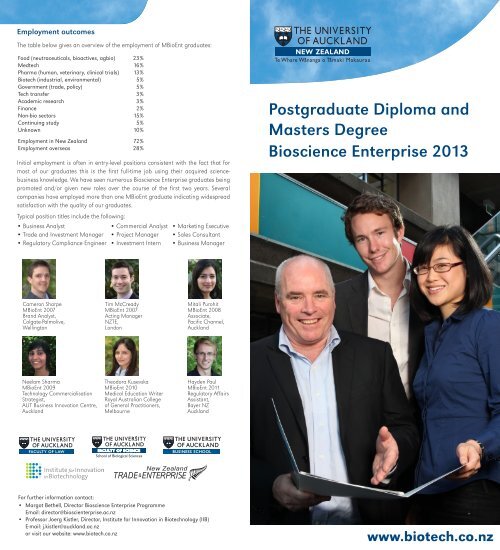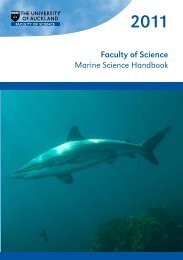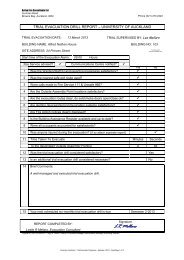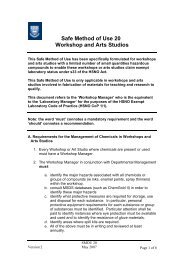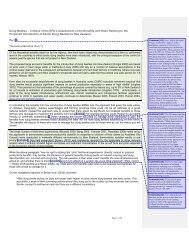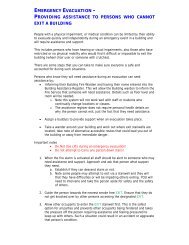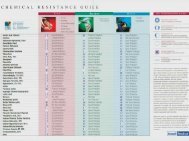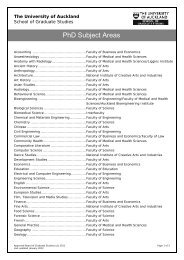Bioscience Enterprise brochure 2013
Bioscience Enterprise brochure 2013
Bioscience Enterprise brochure 2013
Create successful ePaper yourself
Turn your PDF publications into a flip-book with our unique Google optimized e-Paper software.
Employment outcomes<br />
The table below gives an overview of the employment of MBioEnt graduates:<br />
Food (neutraceuticals, bioactives, agbio) 23%<br />
Medtech 16%<br />
Pharma (human, veterinary, clinical trials) 13%<br />
Biotech (industrial, environmental) 5%<br />
Government (trade, policy) 5%<br />
Tech transfer 3%<br />
Academic research 3%<br />
Finance 2%<br />
Non-bio sectors 15%<br />
Continuing study 5%<br />
Unknown 10%<br />
Employment in New Zealand 72%<br />
Employment overseas 28%<br />
Initial employment is often in entry-level positions consistent with the fact that for<br />
most of our graduates this is the first full-time job using their acquired sciencebusiness<br />
knowledge. We have seen numerous <strong>Bioscience</strong> <strong>Enterprise</strong> graduates being<br />
promoted and/or given new roles over the course of the first two years. Several<br />
companies have employed more than one MBioEnt graduate indicating widespread<br />
satisfaction with the quality of our graduates.<br />
Typical position titles include the following:<br />
• Business Analyst • Commercial Analyst • Marketing Executive<br />
• Trade and Investment Manager • Project Manager • Sales Consultant<br />
• Regulatory Compliance Engineer • Investment Intern • Business Manager<br />
Cameron Sharpe<br />
MBioEnt 2007<br />
Brand Analyst,<br />
Colgate-Palmolive,<br />
Wellington<br />
Neelam Sharma<br />
MBioEnt 2009<br />
Technology Commercialisation<br />
Strategist,<br />
AUT Business Innovation Centre,<br />
Auckland<br />
Tim McCready<br />
MBioEnt 2007<br />
Acting Manager<br />
NZTE,<br />
London<br />
Theodora Kusevska<br />
MBioEnt 2010<br />
Medical Education Writer<br />
Royal Australian College<br />
of General Practitioners,<br />
Melbourne<br />
Mitali Purohit<br />
MBioEnt 2008<br />
Associate,<br />
Pacific Channel,<br />
Auckland<br />
Hayden Paul<br />
MBioEnt 2011<br />
Regulatory Affairs<br />
Assistant,<br />
Bayer NZ<br />
Auckland<br />
Postgraduate Diploma and<br />
Masters Degree<br />
<strong>Bioscience</strong> <strong>Enterprise</strong> <strong>2013</strong><br />
For further information contact:<br />
• Margot Bethell, Director <strong>Bioscience</strong> <strong>Enterprise</strong> Programme<br />
Email: director@bioscienterprise.ac.nz<br />
• Professor Joerg Kistler, Director, Institute for Innovation in Biotechnology (IIB)<br />
E-mail: j.kistler@auckland.ac.nz<br />
or visit our website: www.biotech.co.nz www.biotech.co.nz
Goals of the programme<br />
Business and science often seem like two different worlds. The<br />
Postgraduate Diploma in <strong>Bioscience</strong> <strong>Enterprise</strong> and Master of <strong>Bioscience</strong><br />
<strong>Enterprise</strong> represent an interdisciplinary programme which aims to give<br />
science graduates the skills to move with confidence in both. You will<br />
gain skills in the financial, marketing and legal aspects of science which<br />
will prepare you for a wide range of job opportunities in science and<br />
business enterprises. The programme also offers plenty of networking<br />
opportunities for students to meet practitioners and leaders from<br />
industry and business. Scientists graduating from this programme will<br />
be business-savvy and comfortable in a business environment, and may<br />
give a company a competitive edge or be the key to a successful start-up.<br />
Employment opportunities<br />
Potential opportunities for graduates include marketing, market-analysis,<br />
product development, the regulatory and business development aspects<br />
of research commercialization in biotech companies, pharmaceutical<br />
companies, reagent or devices companies, the food and beverages<br />
industry, in technology transfer offices at Universities and Crown Research<br />
Institutes, and as analysts and consultants in business development firms,<br />
finance and investment firms, and Government agencies.<br />
Internships and employment examples<br />
Companies and organisations that have offered internships and/or<br />
employment include:<br />
• AFT Pharmaceuticals<br />
• AgResearch<br />
•AstraZeneca, Sydney<br />
• ATEED<br />
• Baldwyns<br />
• Baxter’s Healthcare<br />
• Bayer NZ<br />
• Biomatters<br />
• BioPacific Ventures<br />
• Box Hill Institute, Melbourne<br />
• CoDa Therapeutics<br />
• Coloplast Ltd, Hongkong<br />
• Cranleigh Merchant Bankers<br />
• Cawthron<br />
• Comvita<br />
Enrolment<br />
Candidates for entry in the PGDipBioent must have a bachelors degree<br />
related to the life sciences eg. BSc with a major or specialisation in<br />
Biological Sciences, Bioinformatics, Biomedical Science, Food Science,<br />
Medicinal Chemistry, Pharmacology, or Psychology; or a BE in Biomedical<br />
Engineering; or a BPharm; or a BTech in Biotechnology.<br />
Enrolment can be fulltime (first semester start only) or part-time. The latter<br />
will appeal to employees who wish to upskill and extend their knowledge<br />
base. Most SCIENT classes are held on weekday evenings 4-7pm.<br />
Entry in the Masters programme requires completion of the PGDipBioent<br />
with a B+ average in at least 90 points. The Masters programme consists<br />
of two compulsory courses and a 6-month internship in a company or<br />
Government organisation during which candidates research a sciencebusiness<br />
project and write a thesis.<br />
<strong>Bioscience</strong> <strong>Enterprise</strong> Forum<br />
• Douglas Pharmaceuticals<br />
• Ernst & Young, Mannheim<br />
• Fisher & Paykel Healthcare<br />
• Ingredient Solutions<br />
• Innate Immunotherapeutics<br />
• Johnson & Johnson, Sydney<br />
• KODE Biotech<br />
• Lanzatech<br />
• MoRST<br />
• Mesynthes<br />
• Merck Serono, Sydney<br />
• Neuren<br />
• New Image<br />
• NZBIO<br />
• NZ Trade & <strong>Enterprise</strong><br />
• Pacific Channel<br />
• Plant & Food Research<br />
• Polybatics<br />
• Pulsecor<br />
• Roche (NZ)<br />
• Scion<br />
• Synergenz<br />
• Sygenta, Basel<br />
• Sutton Group<br />
• UniServices<br />
• Unlimited<br />
• Vital Foods<br />
• ViaLactia<br />
• Vodafone<br />
• Watercare<br />
Students are required to attend the <strong>Bioscience</strong> <strong>Enterprise</strong> Forums which<br />
are held on Fridays 4.30 - 6.30pm once a month. These forums consist of a<br />
seminar given by senior industry practitioners followed by a social function to<br />
facilitate networking between students and corporate people.<br />
Postgraduate Diploma in <strong>Bioscience</strong> <strong>Enterprise</strong><br />
(PGDipBioent) - year one<br />
Requirement:<br />
90 points: SCIENT 701-706<br />
30 points: electives from a wide range of 700 - level courses related to the life sciences.<br />
SCIENT 701 (first semester) (15 Points)<br />
Accounting and Finance for Scientists<br />
Builds upon scientific numeracy in exploring the: sources, uses and reporting of accounting and financial<br />
information in science-based enterprises; application of capital budgeting and valuation theory to sciencerelevant<br />
situations; and key bases for financially informed project and enterprise decision-making and the<br />
management of economic resources.<br />
SCIENT 702 (first semester) (15 Points)<br />
Marketing for Scientific and Technical Personnel<br />
Examines the: intermediaries and end-users of technical and research-related applications, products and<br />
services; their “customers”, “value chain”, “marketing”, and related concepts in both highly-regulated and open<br />
markets; and how effective science-related marketing strategies and promotional efforts are developed and<br />
communicated.<br />
SCIENT 703 (second semester) (15 Points)<br />
Frontiers in Biotechnology<br />
An examination of how breakthrough discoveries in contemporary life sciences flow through to commercialisation.<br />
Current and emerging applications of biotechnology; includes guests lectures from New Zealand’s leading<br />
biotechnologists and case studies focused particularly on medical applications.<br />
SCIENT 704 (first semester) (15 Points)<br />
Law and Intellectual Property<br />
An explanation of the legal system including basic concepts of contract and corporate law in a biotechnology<br />
context. Emphasis will be upon intellectual property laws in particular patent law and practice and other<br />
means of protecting new ideas, discoveries and inventions. Also covered will be technology licensing and basic<br />
competition and marketing law.<br />
SCIENT 705 (second semester) (15 Points)<br />
Research Commercialisation<br />
Integrative exploration of common theories, processes and models involved in commercialising scientic<br />
research. Topics include technology transfer, technological entrepreneurship, commercial potential, risk, and<br />
valuation assessment and related tools. Utilises multiple learning approaches including case studies and a<br />
“hands-on” term project.<br />
Prerequisite: SCIENT 701 and 702<br />
SCIENT 706 (second semester) (15 Points)<br />
Commercialisation Project<br />
A supervised practical application of the theories, concepts and techniques of commercialisation, covered in<br />
courses SCIENT 701-705, to a real research-based opportunity and its related intellectual property estate.<br />
Prerequisite: SCIENT 701, 702, 704<br />
Corequisite: SCIENT 703, 705<br />
Master of <strong>Bioscience</strong> <strong>Enterprise</strong><br />
(MBioent) - year two<br />
Requirement: successful completion of PGDipBioEnt<br />
90 points: SCIENT 794 Thesis<br />
30 points: SCIENT 720, 721<br />
SCIENT 720 (15 Points)<br />
Science <strong>Enterprise</strong> Research Methods<br />
Students will become familiar with underlying theory and best practices in the principal qualitative and<br />
quantitative methods applicable to and useful in thesis research on commercialisation and science based<br />
enterprise.<br />
SCIENT 721 (15 Points)<br />
Product Development and Regulatory Environments<br />
Aims to give students an understanding of the stages of product development for therapeutics, diagnostics and<br />
medical devices, as well as the regulatory requirements affecting product development in the Life Sciences.<br />
Project management tools and processes will also be covered in the context of product development.<br />
SCIENT 722 (15 Points) (currently not available)<br />
Current Issues in <strong>Bioscience</strong> <strong>Enterprise</strong><br />
An exploration of trends and developments of importance to Life Sciences-related enterprises and industries.<br />
Utilises multiple learning approaches - e.g., independent readings, case studies, projects, guest speakers,<br />
presentations and related discussions.<br />
SCIENT 794A and B (90 Points)<br />
Thesis<br />
Research project addressing a topic relevant to the commercialisation of research. Overseen jointly by both<br />
academic and industry supervisors. Subject to approval from the Programme Director, project can be carried<br />
out while employed in a science or business enterprise.


